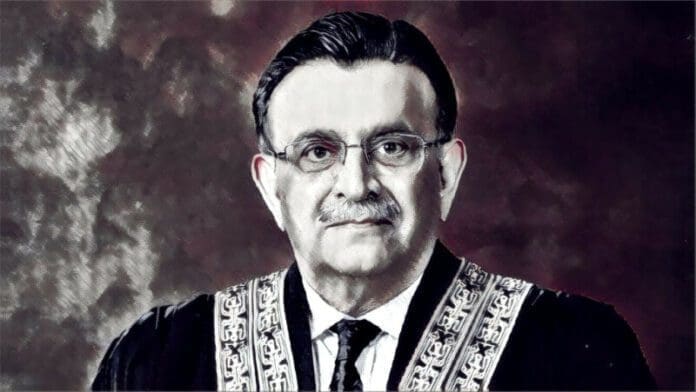In a world where justice is often under threat, Umar Ata Bandial, Pakistan’s 28th Chief Justice, stood steadfast in upholding what is right. Despite facing numerous challenges and opposition, he remained committed to his principles and refused to compromise.
During his tenure, Chief Justice Bandial faced significant difficulties as the country experienced political upheaval and turmoil. He was obstructed and opposed by various parties and factions, including the Pakistan Tehreek-i-Insaf (PTI), Pakistan Democratic Movement (PDM), establishment, bureaucracy, press, and even a divided bench. Despite these challenges, Chief Justice Bandial maintained his integrity and navigated an impossible situation with skill and patience.
One of the defining moments of his tenure came when a no-confidence vote was brought against the PTI government. While some argued for the legality of such a vote, Chief Justice Bandial believed that elected governments should always serve out their full terms. However, the vote was ultimately rejected, and the National Assembly was dissolved by the President. The Supreme Court intervened and, in a historic decision, ruled that the dissolution was illegal and restored the assembly. Chief Justice Bandial demonstrated his unwavering commitment to upholding the Constitution and the sanctity of Parliament.
Another significant judgment during his tenure concerned the disqualification of members of the National Assembly who voted against their party’s direction. This issue was brought to the Supreme Court by President Alvi, seeking advice on whether such votes should be counted and whether the members could be disqualified for life. The court, in a majority decision, ruled that dissident votes should not be counted and linked this decision to the freedom of association and the rights of political parties. While the judgment faced criticism, Chief Justice Bandial and the court stood by their decision, emphasizing the importance of party discipline and the need to prevent political defections.
The Bandial court also found itself at odds with the government when it came to holding timely elections. Despite constitutional provisions stipulating that elections must be held within 90 days after the dissolution of the National Assembly, the government continually raised various excuses to delay the polls. However, Chief Justice Bandial and the court reaffirmed the importance of the 90-day deadline and ordered the government to hold elections within the specified timeframe. This decision faced opposition and threats from the government and other influential parties, but Chief Justice Bandial and the court remained resolute in their commitment to upholding democracy.
In his final act before retiring, Chief Justice Bandial also set aside controversial legislation that aimed to close corruption cases against politicians. Despite criticism, he recognized the importance of combating corruption and ensuring that no one is above the law.
As Chief Justice Bandial passes the baton to his successor, Justice Qazi Faez Isa, his legacy as a defender of justice and the rule of law will endure. He has shown unwavering dedication to upholding constitutional principles and ensuring justice prevails, even in the face of immense challenges. Chief Justice Bandial’s commitment to preserving the integrity of the judiciary and democracy itself is an honorable testament to his character and a source of inspiration for future generations.
